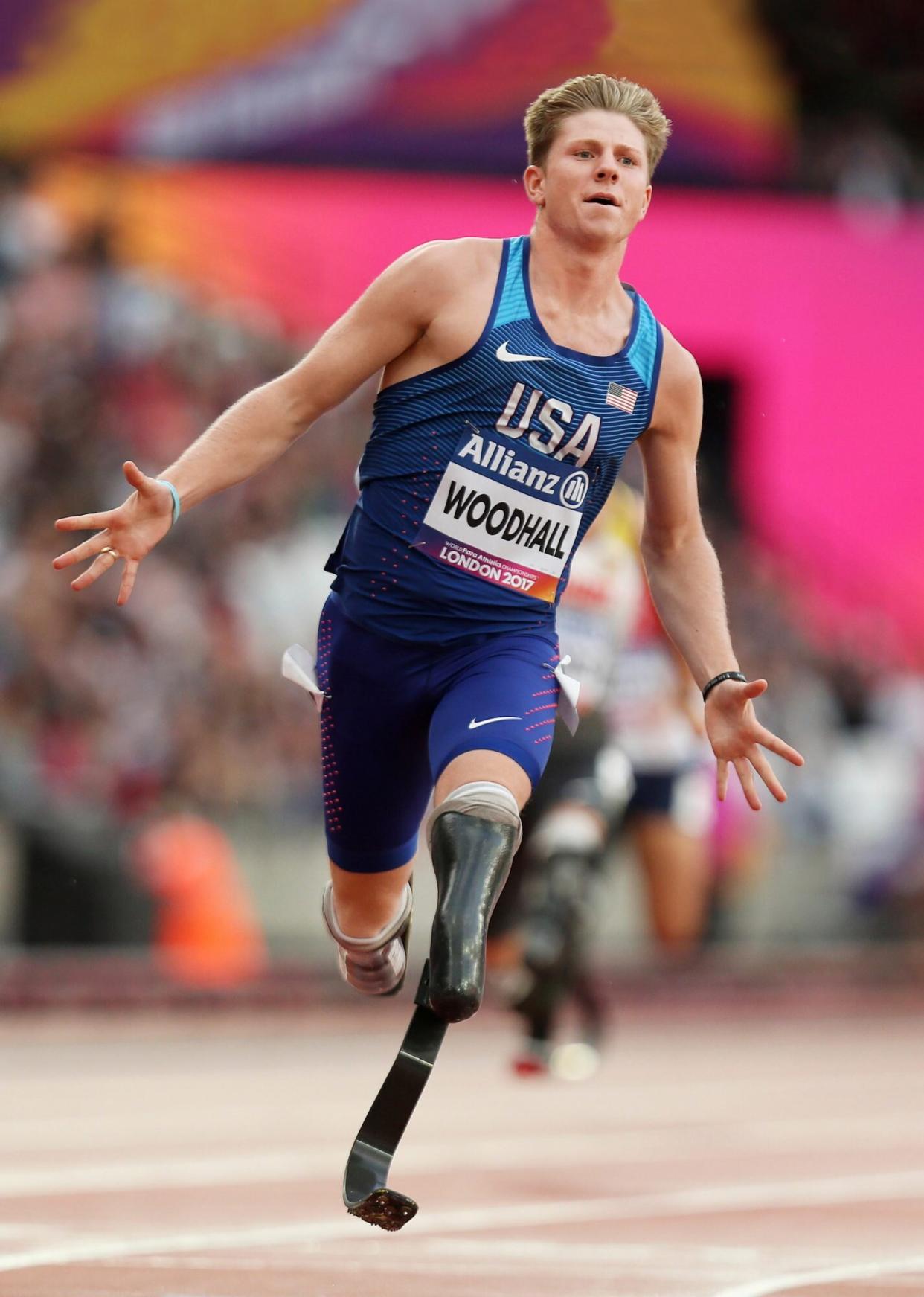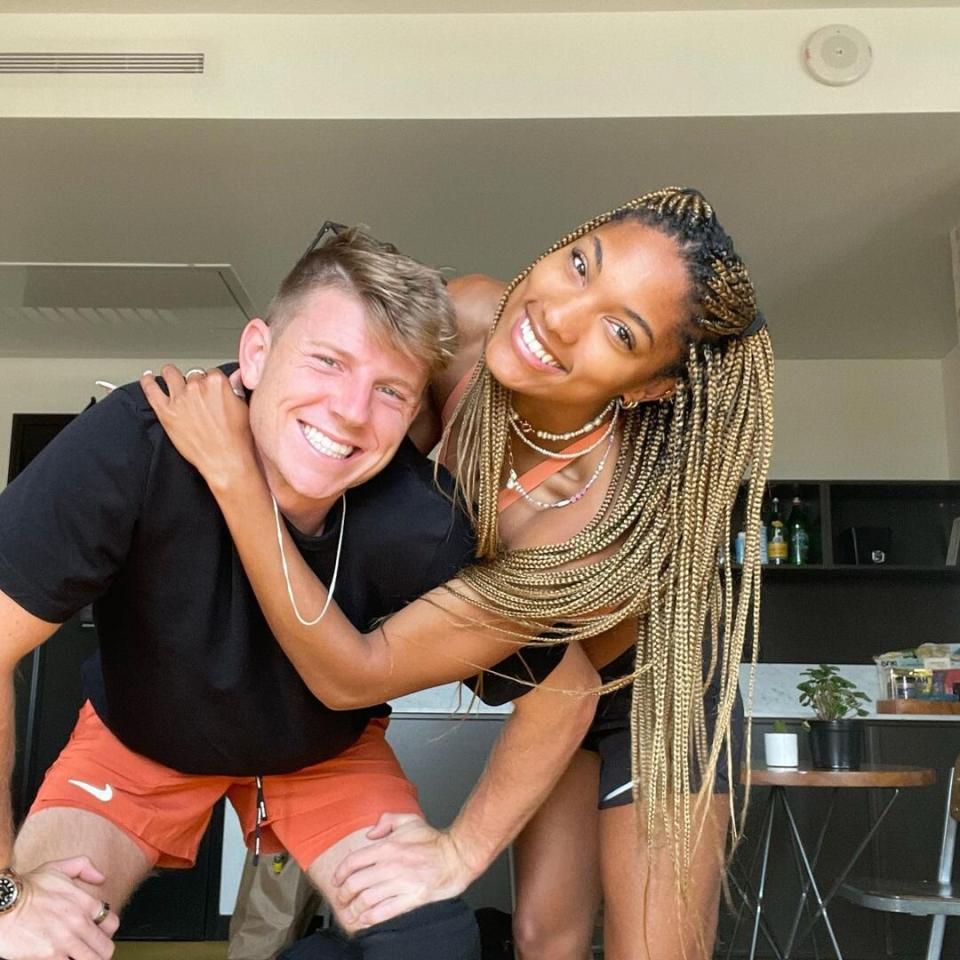Sprinter Hunter Woodhall Says Bullying Helped 'Shape' Him Into Successful Paralympian

- Oops!Something went wrong.Please try again later.
James Marsh/bpi/Shutterstock Hunter Woodhall
" ' Man, I could be really good at this,' " Hunter Woodhall recounts thinking early on in his track career as just a teen athlete with a vision.
Now, as the 22-year-old begins his second Paralympic Games with eyes on a third and fourth medal, the sprinter's dreams are absolutely a reality.
Woodhall was born with a condition called fibular hemimelia — a birth defect where part or all of the fibula bone is missing — and a fused ankle. He says that doctors were uncertain he would ever walk, and due to the condition's rarity there "wasn't really a clear path or clear direction."
"It took actually a while to figure out that amputation might be a good solution," Woodhall recounts in an interview for this week's issue of PEOPLE, noting that reaching the decision to remove both of his lower legs was "difficult" for his parents, Steve and Barb Woodhall.
They ultimately moved forward — with help and guidance from family and their church — when Woodhall was 11 months old, following corrective surgery attempts that would have, at best, left him requiring a wheelchair or only walking with assistance.
The athlete — who received his first prosthetics at just 15 months old — says, "Obviously, it turned out right." He knows that "everything happens for a reason," and, "I think that the reason was, everything that I do now requires me to be able to move as a normally abled person."
That "everything happens for a reason" mentality has applied to numerous aspects of Woodhall's life, especially as he faced a difficult transition from homeschooling to a private school in fifth grade. It was the first time he was truly exposed to other children, after spending much of his youth in his family's "tight-knit" homeschool community in Utah.
"I came in as the new kid, and then I came in as the new kid without legs," Woodhall recounts, noting, sadly, "kids can be mean." For two years, he dealt with being "made fun of every day" until he switched schools.
The same thing happened when he tried to follow his brothers into sports, with Woodhall trying pretty much everything. He often rode the bench or was "in the back, and there was never really a good reason for it."
The runner tells PEOPLE he mostly kept the bullying to himself until he was older, feeling both embarrassed and a fear of burdening his family with regrets over the decision to amputate his legs: "I just held it in, and dealt with it on my own."
RELATED: Meet Some of the Paralympians to Follow at This Summer's Games in Tokyo
"I think all the things that happen to us in life shape us for who we're going to be, especially the hard times," says Woodhall now, with clarity gained over the years. And, the experience, "100 percent" molded him as an athlete, and pushed him to excel when he discovered his aptitude for track in seventh grade.
Woodhall — who runs with prosthetic blades — recounts now that it "was the first time that I found a sport that I was the one in control. No one could put me on the bench, no one could tell me what to do. And the success that I found was based solely on how much work that I put into it."
For more about Team USA's Paralympians, pick up this week's issue of PEOPLE.
Of the sport, he effuses, "There's no one to hide behind, there are no excuses, there's nothing. It's just you against the clock. And I just really fell in love with the roundness of that, and being able to see a direct correlation between the things that I was doing and the progression that I was seeing."
Eventually, Woodhall — after winning a bronze and a silver medal at the Paralympics in Rio de Janeiro in 2016 — signed with the University of Arkansas, becoming the first double amputee to receive a Division 1 scholarship in track and field. "It's just been straight grind ever since," Woodhall says.
Track and field events begin next Friday in Japan, and Woodhall will compete in the 400m run and 100m dash.
RELATED VIDEO: Gold Medalist Maggie Steffens on the "Badass" Women Who've Inspired Her Olympic Journey
When he's not on the track, Woodhall is spending time with his longtime girlfriend, Tara Davis, who placed sixth in the long jump at the Olympics earlier this month. Though the couple's time in Tokyo didn't overlap, they're grateful for the shared experience.
"This will be his second Paralympics, but for me, it was my dream. It was my Olympic dream. That's my dream," Davis, 22, tells PEOPLE. "And to experience at a time and be a couple that are Olympians is just insane."
RELATED: Hunter Woodhall on Overcoming Bullying to Find Success as a Paralympian: I 'Fell in Love' with Track

Hunter Woodhall/Instagram Hunter Woodhall and Tara Davis
"It means everything. I think literally representing the United States especially in an Olympic or Paralympic Games is the pinnacle of our sport. It does not get any better than that," Woodhall echoes.
"I have so much pride competing for this country. And I think it gives us an ability to show who we are, show what we represent, which I hope in turn would reflect what we see this country to be," he adds.
To learn more about Team USA, visit TeamUSA.org. Watch the Tokyo Olympics starting Aug. 24 on NBC.

